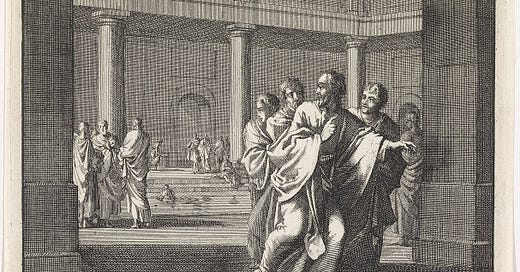The doctrine of religious tolerance before Vatican II transformed it
A doctrine which contradicts another cannot be said to have developed from it—and as we can see here, that is precisely what happened with the Vatican II doctrine of religious liberty.

A doctrine which contradicts another cannot be said to have developed from it—and as we can see here, that is precisely what happened with the Vatican II doctrine of religious liberty.
On Religious Tolerance
Aemil Dorsch, De Ecclesia Christi, 1928
pp, 552-556
Translated by a friend of The WM Review
According to the principles we have just explained, it is very clearly deduced what should be thought about tolerance.
Indisputably, dogmatic or ethical tolerance is impious and absurd.
1. Explanation.
Tolerance should not be completely confused with indifferentism, although it somewhat coheres with it.
Indifferentism is more of an internal disposition, from which someone judges and feels indifferent directly towards either all or some religions, thereby denying the necessity of religion in general or the Catholic religion in particular.
But tolerance is an external attitude by which someone behaves equally in external conduct towards other religions distinct from the one they profess, and their followers, abstracting from any internal assessment of those religions.
Then, a system or doctrine that defends this way of behaving as just is also called by the same name. At first glance, tolerance seems to be somewhat derived from indifferentism, applying it to one’s actions; in this matter, to avoid confusion, the following should be carefully distinguished.
a) There is a certain Christian tolerance by which, not the error itself or a false religion, but the erring individuals are tolerated, and indeed loved: "Do not hate, except for vices;” so said St. Augustine about this tolerance “love the people".1 This tolerance has nothing in common with indifferentism in reality except for a certain external appearance.
b) The other is a political tolerance, which consists in the public tolerance of various religions, including false ones, i.e., they are not prohibited by laws but permitted, and their followers are treated equally before the law, regarding rights and public duties.
However – and this is the specific difference of this tolerance – this is so not at all from the motive that these religions are equal according to their internal value, but from an external motive, so that public peace is not disturbed and greater evils do not follow.
Regarding this political tolerance, St. Thomas Aquinas long ago said:
"Human government is derived from divine government and should imitate it. However, although God is omnipotent and supremely good, He nevertheless permits some evils to occur in the universe, which He could prevent: lest, if they were removed, greater goods would be taken away or even worse evils would follow. Therefore, in human government, those who are in charge rightly tolerate some evils, lest some goods be hindered or even lest worse evils be incurred."2
Similarly, Pope Leo XIII in the encyclical of November 1, 1885, stated:
"The Church, indeed, deems it unlawful to place the various forms of divine worship on the same footing as the true religion, but does not, on that account, condemn those rulers who, for the sake of securing some great good or of hindering some great evil, allow patiently custom or usage to be a kind of sanction for each kind of religion having its place in the State."
Therefore, this political tolerance is not simpliciter permissible, yet under certain circumstances, it is not illicit.
c) Finally, there is a third, namely dogmatic or ethical tolerance, which, like political tolerance, legally equates various and opposing religions in public life. Yet it differs in motive: ethical tolerance simply tolerates all religions without a reason, or grants full freedom to all religious professions, because all such religions are (supposedly) considered before God and in terms of salvation of the same right, value, and importance.
This is nothing but pure and rotten indifferentism carried into action; and thus it is equally damnable and condemnable.
II. Demonstration.
The absurdity of the matter is almost immediately evident.
1. Certainly, it is at least as an implicit judgment attached to this tolerance that false religions are of the same value as the true religion. However, when it comes to value, the true can never be compared or equated with the false.
Moreover, for the Church itself to demand such a thing, to place itself on the same level with false sects or even to abstain from preaching itself as the sole ark of salvation, would add absurdity and impiety. For if the Church were to concede to this demand, it would fail in its own duty and miserably perish, betraying the divinely revealed truth, fostering rebellion against God Himself, and inflicting the gravest injury upon Him.
For by doing so, the Church would permit people to deny faith in God revealing, to scorn and reject the truths revealed by Him and His institutions at will, indeed placing them on the same level as diabolical filth.
Indeed, "to think about religion," as Leo XIII says (l.c.), "as if there were no difference at all between diverse and opposing forms, leads directly to this: to approve none by judgment, to use none; yet this, if it differs in name from atheism, differs in nothing from it in reality."
Christian attitude towards heresy and religious error
2. The Christian sense in this matter has been consistent since the times of the Apostles. Thus, the Apostle to the Gentiles already declares anyone anathema who preaches a gospel other than what the faithful have heard from him (Galatians 1:8 sq.); he also writes to Titus:
"A man that is a heretic, after the first and second admonition, avoid: knowing that he, that is such a one, is subverted and sinneth" (Titus 3:10 sq.).
And that disciple who preaches nothing but love, even he instructs:
"If any man come to you, and bring not this doctrine, receive him not into the house nor say to him, God speed you" (2 John 10).
Irenaeus recounts about the same Apostle John:
“There are those who heard Polycarp say that when John, the disciple of the Lord, went to bathe in Ephesus and saw Cerinthus inside, he rushed out of the bathhouse without bathing, saying, 'Let us flee, lest even the bathhouse fall down because Cerinthus, the enemy of truth, is inside.'"
“And Polycarp himself once met Marcion, who said to him, 'Do you recognise us?' Polycarp replied, 'I recognise you, the firstborn of Satan.'
“The Apostles and their disciples had such a fear that they would not even verbally communicate with those who had adulterated the truth, as even Paul says,
“'A man that is a heretic, after the first and second admonition, avoid: knowing that he, that is such a one, is subverted, and sinneth, being condemned by his own judgment.'"
Eusebius also reports similar things about Polycarp, narrating in his letter to Florinus:
"I can affirm in the presence of God that if that blessed and apostolic presbyter [Polycarp] had heard such things, he would have immediately exclaimed and stopped his ears, as was his custom, saying, 'Good God, for what times have you reserved me to endure these things!' And he would have fled from the place where he had heard such words, whether standing or sitting."
Without mentioning other testimonies, we conclude with a more famous one from Orosius, testifying about himself:
"I, with Jesus Christ as my witness, confess that I hate heresy, not the heretic; but, as is just, I avoid the heretic for the sake of heresy."3
Here we refer to the propositions condemned in Pius IX's Syllabus:
"In this age of ours, it is no longer expedient for the Catholic religion to be held as the only state religion, to the exclusion of all other forms of worship".4
And, additionally:
"Indeed, it is false that civil liberty of every cult, as well as full power given to all to manifest any opinions and thoughts openly and publicly, leads more easily to the corruption of the manners and minds of peoples and to the spread of the plague of indifferentism."5
See also Leo XIII's encyclical Immortale Dei.6
III. On Intolerance.
Intolerance is that disposition of the mind by which someone, having denounced false religions, does not want to grant them the same rights as the faithful, and indeed, where possible, takes care to remove such individuals from the community of others, lest they cause harm. The same name is then also used for the doctrine that defends these actions as just.
1. First and foremost, again distinguish carefully between errors and those who err, heresies and heretics. Based on this, Pius IX exhorts all the faithful in his encyclical letter dated August 10, 1863:
"Let it be far from the sons of the Catholic Church to be in any way enemies to those who are not united with us by the bonds of the same faith and charity; indeed, they should always strive to pursue and assist them with all the offices of Christian charity, especially the poor, the sick, and those afflicted with any other hardships, and above all to rescue them from the shadows of error in which they miserably lie and endeavor to bring them back to Catholic truth and to the most loving mother Church, which never ceases to extend her motherly hands to them and lovingly call them back to her bosom."
Therefore, the Church can never tolerate errors; however, she can love, indeed she loves, nurtures, and cares for those who err.
Regarding these, however, further attention is needed.
Application to Individuals
2. Sometimes the intolerance of error must also apply to those who err themselves, especially when they strive to spread these errors or cause harm to others; then these erring individuals cannot be tolerated, rather they must be removed from the religious community or at least prevented from causing harm.
However, this intolerance cannot be condemned; for just as any living and healthy organic body naturally seeks to expel harmful humors, any society protects itself and its members from enemies, especially internal rebels; any good shepherd is duty-bound by divine right to separate and drive away wolves from the flock.
"Otherwise”, as St. Leo the Great says,
“Otherwise, we cannot govern those entrusted to us unless we pursue with the zeal of the Lord's faith those who are destroyers and perverted, and as far as we can, cut them off from sound minds, lest this pest spread more widely."
And St. Jerome writes to Theophilus of Alexandria:
"Concerning the extremely nefarious heresy, it displeases many saints that you bear much patience and think that those who are a burden to the Church can be corrected by your leniency: for by waiting for the repentance of a few, you nourish the audacity of the wicked and make the faction stronger" (Letter 63, 3).
3. Moreover, while Protestants [or modern “Liberals”] reproach the Catholic Church for intolerance, they see the splinter in their brother's eye – and they do not consider the beam in their own eye.7
HELP KEEP THE WM REVIEW ONLINE!
As we expand The WM Review we would like to keep providing free articles for everyone. If you have benefitted from our content please do consider supporting us financially.
A subscription from you helps ensure that we can keep writing and sharing free material for all.
Plus, you will get access to our exclusive members-only material!
Thank you!
Related Reading:
Serm. 49 n. 7
2. 2 q. 10 a. 11
Book of Free Will, n. 48
Proposition 77
Propositions 78 and 79
D. 1700-1702, 1712, 1716
See Hurter, note 223 at the end.






The only way a General Church Council can teach error is if it is confirmed by a false pope. I am convinced by the evidence at whitesmoke1958.com that there was a diabolically criminal overthrow of a validly elected pope two days before John XXIII appeared. It is also the fulfillment of prophesy.